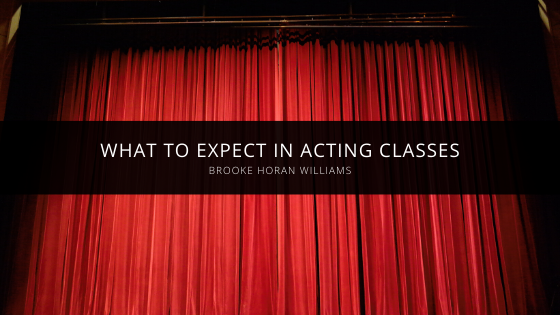Acting school used to be one of those extraordinary educational experiences that only the elite in Hollywood ever pursued. Today, the landscape has changed, and anybody who wants a chance at the big screen is going to acting school. Here, Brooke Horan Williams looks at what some of the acting schools are doing when it comes to creating professional actors.
In the past, you didn’t have to go to school to get a job as an actor Brooke says. Now, things have changed. “There’s a lot of competition out there,” she adds. “You need every advantage you can get.” Going to acting classes increases that advantage. “We’ve already talked about why it’s important to get professional training,” she says. “Now, let’s talk about what you can expect once you’re there.”
What will you learn in acting school that you can’t learn on your own? Plenty, according to Brooke Horan Williams. “It’s a whole different world,” she says, “and it depends on what the school offers.” Some schools offer bachelor’s in fine arts (BFA) degrees, while others will give you just a certificate, she says. You can go to school for four years, or you can go for four weeks – it all depends on what you’re looking for. Brooke says many of the top A-list actors in Hollywood have earned a bachelor’s degree for their craft and some have master’s degrees. Even then, the competition is still fierce.
If you are one of the lucky ones who get accepted to acting school, here’s what you can expect. First, be prepared to be nervous, Brooke says. It’s normal, but you’ll enjoy yourself soon enough. As you go through it, you’ll be building skills as well as confidence. Confidence comes as you get better, she adds. In fact, you’ll start with what you might perceive as silly games and group exercises. “Don’t judge,” she adds. “Just go with the flow.”
You’ll have exercises in breathing, Brooke Horan Williams says. “I’m talking about the breathing you need for acting where you learn to project your voice,” she adds. “If it’s a 4-year degree, you’ll have other general classes, but in preparation for an acting career, you’ll have classes like public speaking and communication.” Then as you go further along, you’ll focus on the basics of creative drama, improvisation, camera techniques, scene preparation, dialogue and monologue, and auditioning techniques. Advanced acting classes will go even deeper into the different methods actors use and a study of advanced acting philosophies. Some schools teach behind the camera basics as well as scriptwriting, so you can get an understanding of the part each person plays when creating a show.
Artistic expression is encouraged, she says, and most places have a pretty nurturing environment overall. “My best advice is to do your research and talk to at least three different schools before signing up with any of them,” Brooke Horan Williams says. “They will be happy to answer questions about their school and the success of their students. Also, do a background internet check on any school you’re considering. If you can talk with some of the graduates, that’s even better.”


